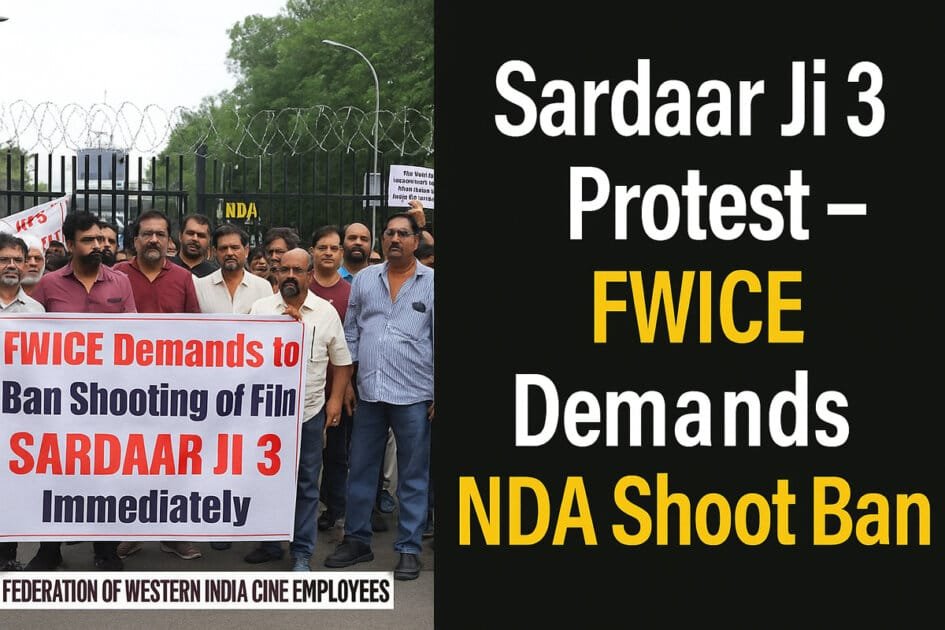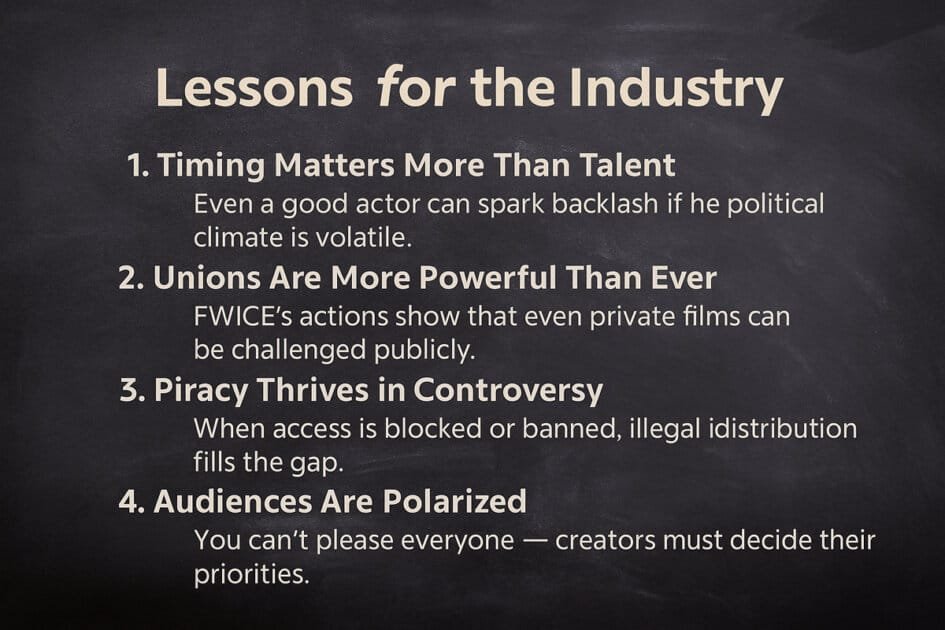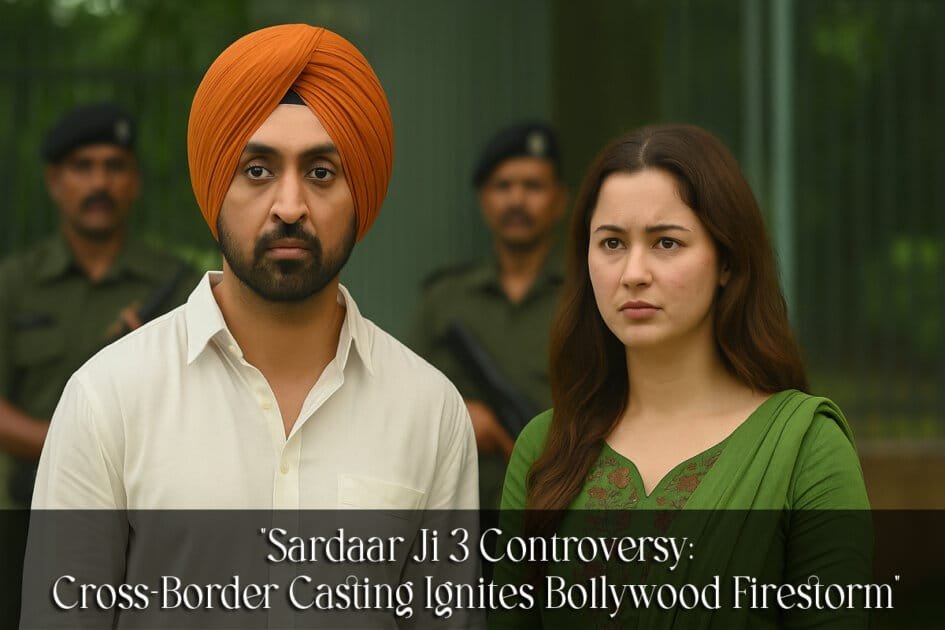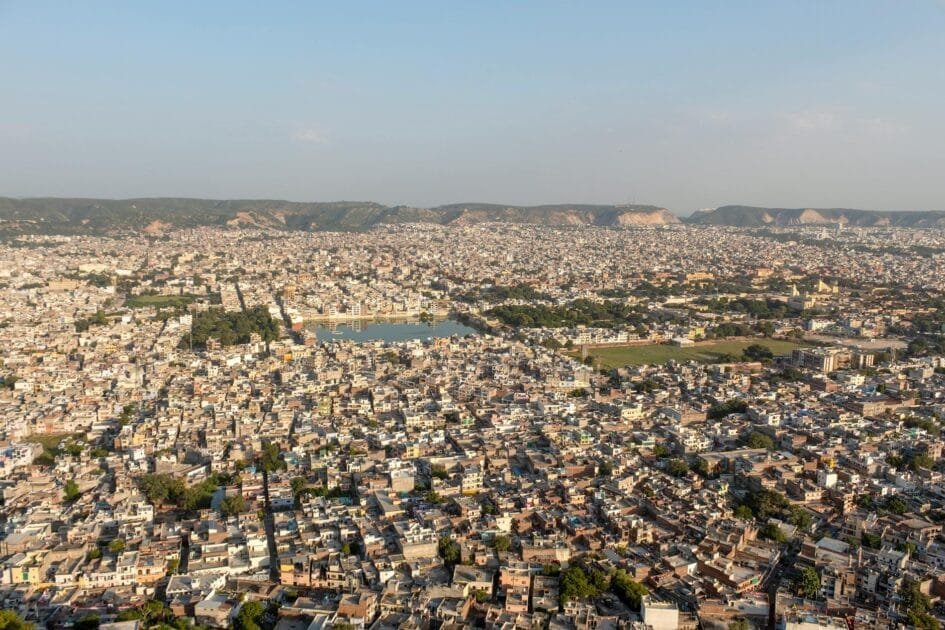Cinema has always been a mirror of society — but sometimes, it becomes the battlefield itself. That’s exactly what happened with the latest installment of the Punjabi blockbuster franchise Sardaar Ji 3, when a casting decision triggered one of the most politically charged entertainment controversies of 2025.
The spark? The inclusion of popular Pakistani actress Hania Aamir in a leading role. The fuel? Ongoing Indo-Pak tensions, an industry union’s objection, and a politically sensitive shooting location. What followed was a whirlwind of outrage, online protests, industry divides, piracy concerns, and a renewed debate about the role of art in politics.
This article dives deep into the Sardaar Ji 3 Controversy — what really happened, who said what, and why it might reshape how the entertainment industry balances creativity with national sentiment.
What is Sardaar Ji 3 and Why Was It Already Anticipated?
Before controversy hijacked the narrative, Sardaar Ji 3 was simply one of the most awaited Punjabi-language films of the year. Starring Diljit Dosanjh, the franchise had previously garnered mass love for its blend of action, comedy, and emotional storytelling — not just in India but in global Punjabi-speaking markets like Canada, the UK, and the USA.
Directed by Rohit Jugraj, this third installment promised to elevate the franchise with a bigger budget, more action, and an international cast. It was meant to be a celebration of Punjabi cinema’s rising global stature. But as is often the case, reality had different plans.
The Casting That Changed Everything: Why Hania Aamir?
Hania Aamir, a well-known Pakistani actress with a massive fanbase among Indian youth via Instagram reels, drama clips, and YouTube compilations, was cast opposite Diljit. On paper, it looked like a strategic move — appealing to Gen-Z audiences across borders.
But timing is everything.
The casting was announced shortly after a terror attack in Pahalgam that raised national security concerns. With diplomatic relations between India and Pakistan already on edge, Hania’s involvement became a lightning rod for nationalist voices.
The move sparked allegations of “cross-border appeasement” and triggered trending hashtags like #BoycottSardaarJi3, #NationBeforeArt, and #NoPakTalentInIndia across social media platforms.

FWICE Steps in: The Industry Union That Escalated the Fight
The Federation of Western India Cine Employees (FWICE), one of the largest film workers’ unions in India, issued a formal complaint not just against the casting, but also against the filming permissions granted at the National Defence Academy (NDA) in Pune — a location considered highly symbolic due to its military importance.
FWICE’s Demands Included:
- Immediate withdrawal of NDA’s permission for any upcoming shoots (especially for Border 2)
- A ban on Pakistani actors in Indian films until diplomatic relations normalize
- A review of the Ministry of Defence’s clearance protocols for film shoots
This wasn’t the first time FWICE had taken such a stand — but this time, the matter reached the desks of Union Ministers Amit Shah and Rajnath Singh, turning a cinematic issue into a full-fledged political topic.
Public Reaction: A Nation Divided on Screens and Scrolls
If you thought the controversy would stay within the film industry — think again. The public response was swift, fierce, and deeply divided.
On One Side:
- Nationalist influencers, YouTubers, and political commentators condemned the film’s team.
- Troll armies targeted Diljit Dosanjh, questioning his patriotism.
- Right-wing handles called for legal action and nationwide bans.
On the Other Side:
- Artists, students, and film critics argued that art must remain borderless.
- Several actors supported Hania Aamir’s right to work in any industry.
- Youth audiences in metropolitan areas called out the “hypocrisy” of those who enjoy Pakistani music but oppose collaboration in cinema.
The debate spilled into newsrooms, talk shows, and social forums — becoming much more than a movie debate. It turned into a cultural referendum.

The Piracy Angle: When Controversy Meets Torrent Culture
Just days after the film’s release overseas (notably not in Indian theatres), Sardaar Ji 3 was leaked on various torrent platforms. Despite piracy laws and cyber-surveillance, the full HD version was made available within hours on Telegram and private piracy sites.
This created two major issues:
- Loss of Revenue: Although the film made over Rs 45 crore in its first week internationally, piracy impacted its domestic revenue potential.
- Moral Dilemma: Some users justified watching pirated versions as a form of protest, while others condemned it as unethical regardless of the political controversy.
The film’s production house appealed for public support and warned of legal action against piracy websites — but the damage, as always, was already done.
Statements and Silence: How the Celebrities Responded
Amid the firestorm, different stakeholders responded — some vocally, some with careful silence.
- Diljit Dosanjh: Remained neutral publicly but posted cryptic lines about peace, unity, and focus on art over politics.
- Hania Aamir: Released a brief Instagram story saying, “Art should unite, not divide.”
- Industry voices like Anurag Kashyap, Swara Bhasker, and Ali Fazal publicly supported creative freedom and called the backlash “manufactured outrage.”
Interestingly, some mainstream Bollywood stars stayed silent, reflecting the high stakes of taking sides in such a politically loaded atmosphere.
What This Means for Bollywood and Cross-Border Art
This incident has triggered deeper questions about:
- Whether filmmakers should self-censor in politically volatile climates.
- If casting decisions will now need security clearance beyond creative intent.
- How unions like FWICE might reshape creative freedom in the name of national interest.
There’s also the underlying fear that such controversies could discourage international collaboration, making Indian cinema more insular at a time when streaming platforms are opening global doors.
Lessons for the Industry: 5 Key Takeaways
- Timing Matters More Than Talent
Even a good actor can spark backlash if the political climate is volatile. - Unions Are More Powerful Than Ever
FWICE’s actions show that even private films can be challenged publicly. - Piracy Thrives in Controversy
When access is blocked or banned, illegal distribution fills the gap. - Audiences Are Polarized
You can’t please everyone — creators must decide their priorities. - Entertainment Is Political — Whether You Like It or Not
Silence is seen as complicity. Voice is seen as rebellion. Neutrality is no longer neutral.
Will the Sardaar Ji 3 Controversy Leave a Lasting Impact?
Yes — and in more ways than one.
The Sardaar Ji 3 controversy has become a symbol of how entertainment, nationalism, youth culture, and social media now intersect. The debate is no longer just about a film or a celebrity. It’s about what kind of stories we allow, who tells them, and under what conditions.
For AryaLekh.com’s readers — especially youth — this is a moment to reflect. Can entertainment remain apolitical? Should creative industries be guided by political winds? And are we, as viewers, becoming more open-minded — or more fragile?
Whatever your view, one thing is clear: the movie may fade, but the questions it raised will not.
TOI: FWICE demands ban on Pakistani actors
IndiaTimes: Sardaar Ji 3 piracy report



